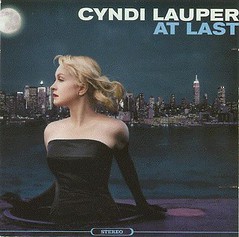
Cyndi Lauper's vocal career has brought her fame and fortune, but precious little respect. It wasn't a case of early success being hard to live up to, but the nature of that early success, which nearly ensured that she wouldn't be taken seriously afterward. Lauper caught a wave -- the 1980s New Wave -- with her first album, She's So Unusual, and she soon became as much an early-MTV icon as A Flock of Seagulls or Duran Duran. Once established, she herself didn't seem to know what to make of herself.
Natural selection in the pop-music business when Lauper was first knocking on the door did not ensure that the fittest, in a qualitative sense, survived. When every other teenager in America was fixated on being a rock star, the odds against being noticed by the producers who mattered was a few million to one. (It remains to be seen whether digital downloads and MP3 files are significantly changing that story.) To register with the recording industry, and then the public, a performer had to stand out dramatically from the background, and that usually meant creating an extreme persona. Talent was possibly an asset, though not sufficient.
A star is reborn
For her follow-up, True Colors, Lauper wasn't so unusual; her next effort, A Night to Remember, was a disc to forget. Although a video I saw years ago of a concert she gave in Paris was startling evidence of the electricity she could bring to a live performance, I lost track of her as she seemed to be devolving into a faded celebrity destined for occasional guest spots on TV shows and parts in third-rate movies.
But in her 2003 disc At Last, which I discovered in the media section of my local public library, Lauper has tackled an ambitious project and carried it off with honors. This is a cabaret-influenced album of modern art songs. She's acting her age, not trying to appeal to the iPod generation, but rather to those of her original fans whose tastes have matured.
The material, mainly songs from the '40s through the '60s, is well suited to Lauper's directly communicative, post-novelty-act style: "Stay," "La Vie en Rose," "Unchained Melody," "If You Go Away" (Rod McKuen's English lyrics grafted onto Jacques Brel's heart-wrenching "Ne Me Quitte Pas"), and "You've Really Got a Hold on Me." Always a better singer than anybody noticed, she puts these and others across with verve and delicacy, as required. The voice has become surprisingly precise, full of interesting modulations of color, and alert to the emotional connotations of the words.
She even measures up to "Hymn to Love," not sounding foolish compared with Edith Piaf's famous version. But the English lyrics are not the ones that Piaf sang ("If you love me, really love me/And whatever happens I won't care" ) -- perhaps she felt that they were too corny for a modern audience. Her edition of the song also ends in a minor key, suggesting some doubt as to the all-conquering power of romantic love. Regardless, it's a memorable performance.
She takes only one serious mis-step, in her duet with Tony Bennett of "Makin' Whoopee." The cringe-making updated lyrics and her spoken asides, delivered in a Betty Boop-like accent, camp it up in a way that undercuts the disc's otherwise authentic spirit.
Still, for anyone who likes the Great American Songbook and '50s classics, this release should be more than satisfying. Even if you never cared for the mannerism of her early albums, don't write off At Last without giving it a listen. Cyndi Lauper has grown into an artiste, or perhaps the artiste that she was all along has finally been allowed to emerge.


No comments:
Post a Comment